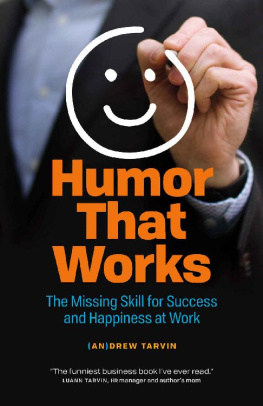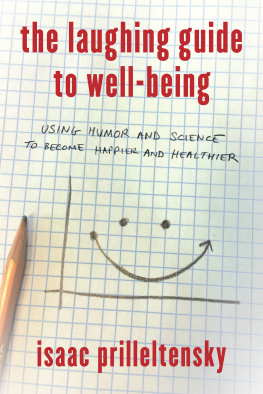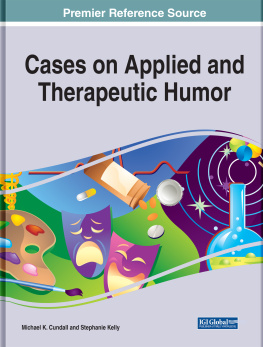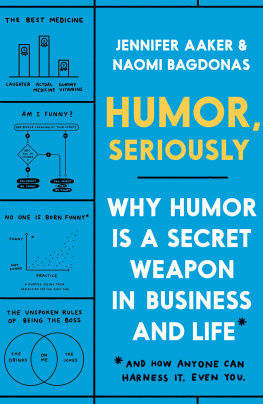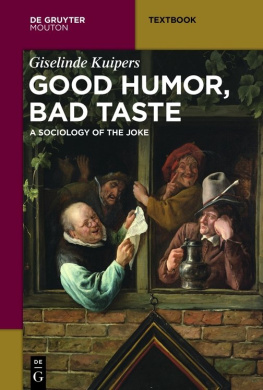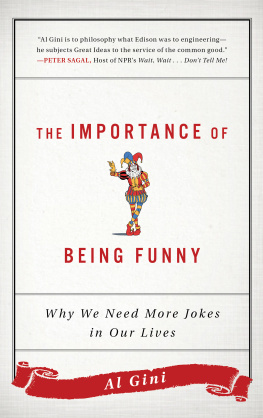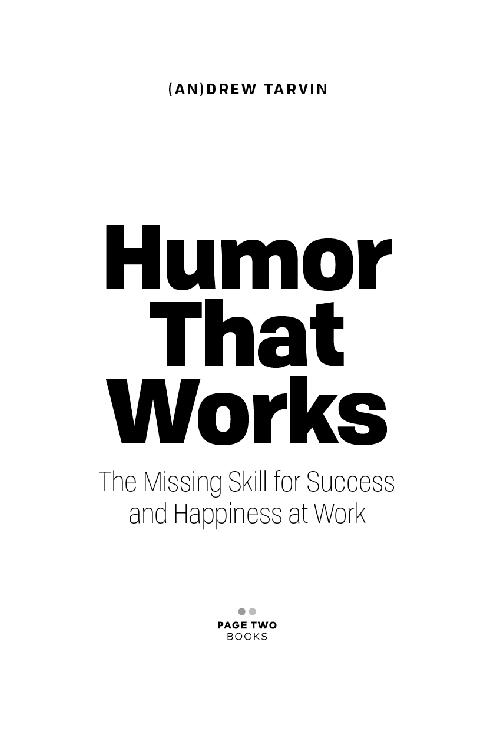Humor That WorksAdvance Praise
Funnily enough, this book is hilariously useful. Think of it as a practical playbook that helps you reconsider the way you do things and results in heightened levels of happiness. Every leader should read this book, work with the tools provided, and get serious about making people smile.
Phil M. Jones
Sales Coach and best-selling author,Exactly What to Say
If Brian Regan and Warren Buffett had a baby... and that baby could write a book... it would be this book! Drews Humor That Works gives real-world examples of how humor increases effectiveness and job satisfaction and sets the stage for more meaningful human interactions that will bring benefits to the workplace and beyond. As Drew writes, To be more human at work, use more humor at work.
Tim McGilloway
Global Solution Manager, Procter & Gamble
Pay attention to the strategies Drew shares in this fantastic bookfilled with ideas on how to help you incorporate humor as a daily habit in your personal and professional life. His ideas will drive productivity, credibility, and connectivity. A must-read for every leader and a great gift for every team member!
Neen James
Attention Expert and author, Attention Pays
In todays world we are constantly bombarded by noise, a noise that manifests itself as pressure, process, and back-to-back meetings. Too easily noise prevails. Drew, with Humor That Works, shows us we can take control. Even better, we can have a good time doing so. Reading this book is eye-opening, not just for what it reveals about the power of humor, but also because it shows how we can master it.
Mary Tafuri
Chief Sales Enablement Officer, IBM Cloud
Drew Tarvins expertise as the worlds first humor engineer shows in Humor That Works. Taking you through the what, why, and how of humor, Tarvin will make a believer out of anyone skeptical that humor is a must-have skill in the workplace. This book will level up your efficiency and effectiveness with unique strategies you dont find in your average business book.
Dorie Clark
Adjunct Professor, Duke University Fuqua School of Business, and author, Entrepreneurial You and Stand Out
The evidence is irrefutable: humor has improved my humanitarian work. Thanks to Drew Tarvins seriously fun approach, I can bring science and innovation to overburdened disaster managers and the vulnerable communities they serve, in memorable and surprisingly effective ways. Humor That Works is about designing and deploying smart communicationeffective and evidence-based, well beyond mere entertainment. Drew helps us understand that there is a process to harnessing humor in your workplace.
Pablo Suarez, Ph.D.
Associate Director for Research and Innovation, Red Cross Red Crescent Climate Centre
Humor
That
Works
Copyright 2019 by Andrew Tarvin
All rights reserved. All lefts as well. No part of this book, physical or metaphysical, may be reproduced, stored in a retrieval system or transmitted, in any form or by any means, without the prior written consent of the publisher, except in the case of brief quotations, embodied in reviews and articles, or slightly longer quotations, if re-written in iambic pentameter. In short, dont be a meanie head.
ISBN 978-1-989025-83-3 (paperback)
ISBN 978-1-989025-84-0 (ebook)
Page Two
www.pagetwo.com
Cover photo by Rachael Lee Photo
Illustrations and exquisite hand modeling by Andrew Tarvin
Ebook by Bright Wing Books (brightwing.ca)
Web: drewtarvin.com
Email:
Social: @drewtarvin
Agenda
Landmarks
0
Introduction
I am a nerd. If youre wondering what type of nerd, the answer is Yes. Computer, math, sci-fi, video game, Star Wars, Star Trek, Star Bucks... All of the above. Specifically, Im an engineer. Like most engineers, I am allergic to the sun (I use SPF building), and Im obsessed with efficiency; I believe the word efficient should be one syllable.
Ever since I can remember, Ive tried to do things as efficiently as possible. Or even since before I can remember, because I was born three weeks early. Even in the womb, I was thinking, Ive got things to do. Lets go, Mom! In kindergarten, my mom told me I had to choose what I wanted people to call me. Did I want to go by Andrew, Andy, or Drew? Five-year-old me chose Drew, and Id like to think it was because its the most efficient form of my name.
In high school, I decided that smart for me was getting a 93 percent in all of my classes, because 93 percent was the lowest grade you could get and still get an A. If I got a 94, a 95, orworst casea 100 percent, I was upset, because it meant I did more work than I had to do.
For college, I went to the Ohio State University, where I received three educations. Not three degreesIm no doctor even if the first two letters of my name are Drbut three educations.
The first education was my actual degree: computer science and engineering, where I learned how to think, how to develop processes for efficiency, and how to program a robot we named Mordecai and the Dancing Yiddish Clowns. I learned the wonders of project plans, critical path schedules, and that scope isnt just a mouthwash. And I learned the technical skills I needed to complete tasks.
The second education was in becoming a resident advisor,where I learned how to better interact with fellow human beings, how to engage with people on multiple levels, and how to use 47 meal swipes in the last three days of the semester. I learned the importance of emotional intelligence, empathy, and empanadas (there was a good Mexican place near campus). And I learned the relationship skills I needed to manage a job.
The third education was in starting an improv comedy group, where I learned how to make people laugh, how to listen more intently, and how to turn any suggestion into a pun. I learned the power of yes and, comedic structure, and confident delivery. And I learned the humor skills I needed to enjoy a lifetime.
After graduating from Ohio State, I started working at Procter & Gamble as an IT project manager, where I managed the portal (a fancy word for website) for modeling and simulation in upstream research and development, led multimillion-dollar projects for a $ 350-million brand, and became a trusted advisor for the Prestige sales team because of my analytics skills and boyish charm (but mostly my analytics skills). I realized along the way that the success I was having at P&Gthe awards, promotion, opportunity, and thorough enjoyment of what I was doingwas a result of my three educations at Ohio State.
Computer science taught me to find the best way to do things. I read top-rated business books and learned how to get things done, how to win friends and influence people, and how to habitually be highly effective seven ways. I consistently sought feedback from my managers so I could iterate improvement, and I deconstructed my work into its most basic components so I could do it as efficiently as possible.
My experience as a resident advisor taught me to manage people up, down, and across the organization. I recognized that my success was not going to be solely from my technical skills; I had to manage the human component of work. I started playing the politics of the corporate world, taking on certain projects for visibility, and saying, Lets circle back on this when I never wanted to talk about a subject ever again.
And improv taught me to use humor. I realized people were far more likely to do something if it was fun, myself included. I found ways to insert funny and/or embarrassing pictures of myself in my presentations, added jokes at the ends of emails (which I aptly named PS for the Pun Script), and started an internal blog that revolved around these three thingsengineering, emotional intelligence, and humor.

